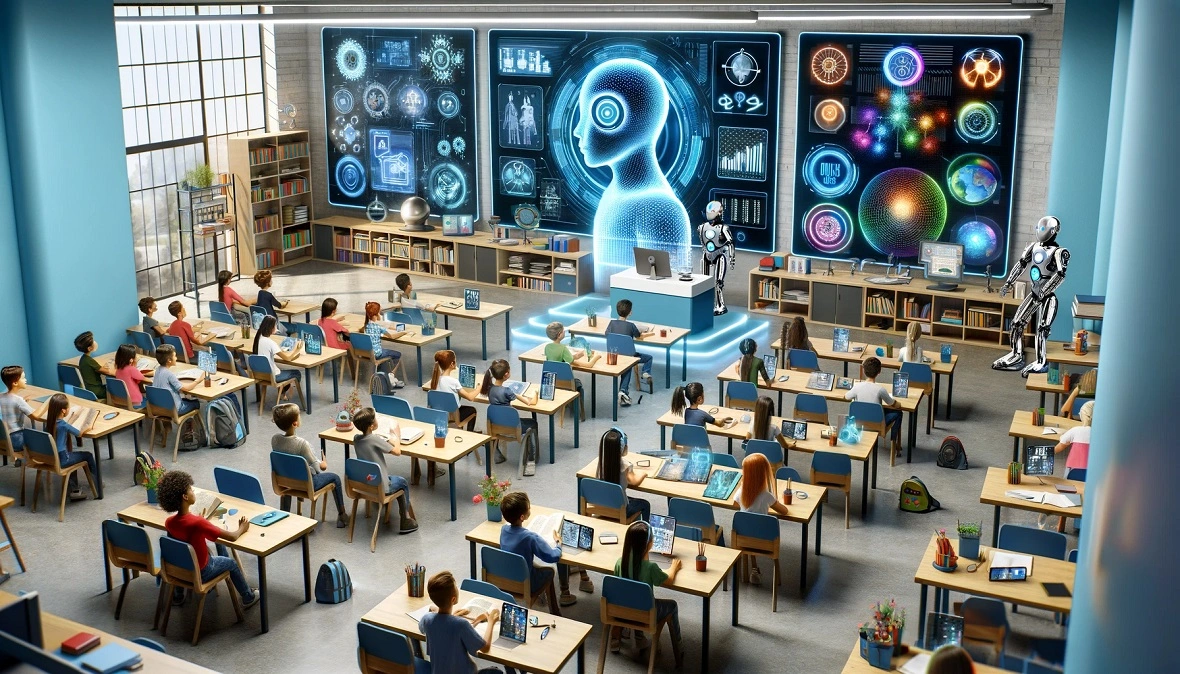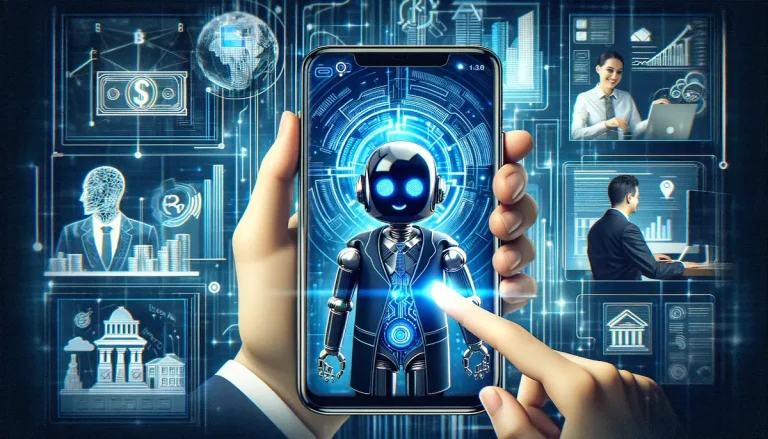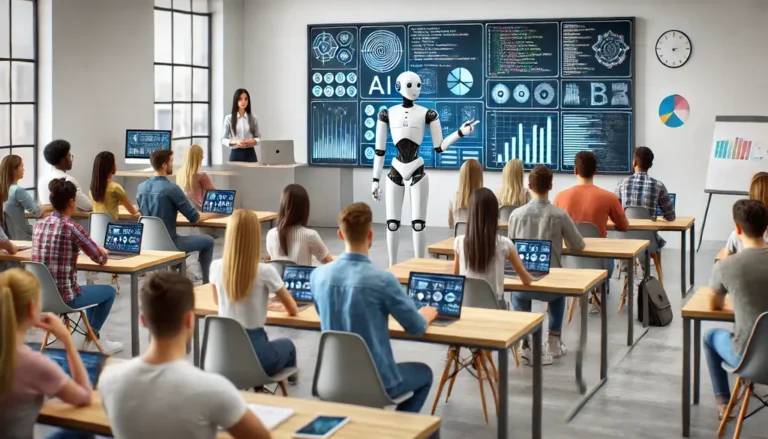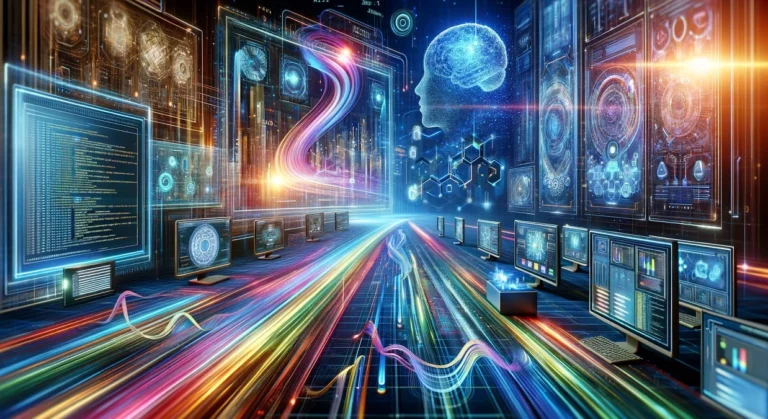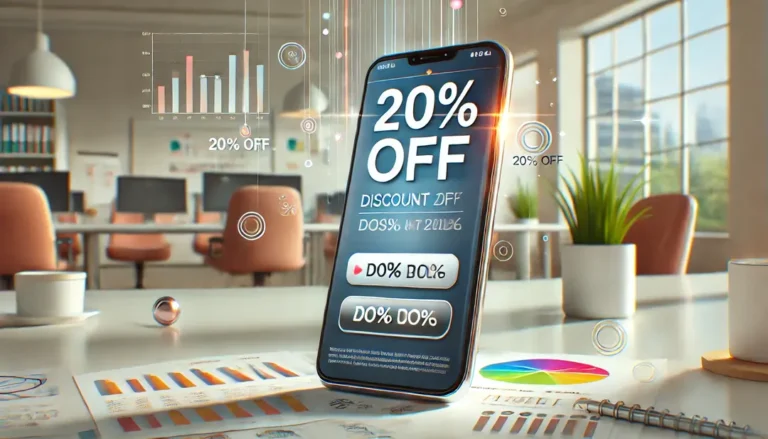As we step into 2024, the landscape of education continues to undergo transformative changes, with Artificial Intelligence leading the charge. Gone are the days of one-size-fits-all education; we’re now entering an era where personalized learning environments, powered by AI, are becoming the norm.
The integration of AI in education is not just a fleeting trend but a comprehensive overhaul of traditional teaching and learning methodologies. This blog post delves into the multifaceted role of AI in education, exploring its current applications, potential challenges, and the promising future it holds for students and educators alike.
Personalized Learning Experiences
The advent of personalized learning experiences, facilitated by Artificial Intelligence, marks a revolutionary shift in educational paradigms. Unlike traditional one-size-fits-all teaching methods, AI enables the creation of tailored educational journeys that cater to the unique needs, abilities, and learning styles of each student.
By analyzing data on students’ past performance, learning preferences, and engagement levels, AI algorithms can customize content delivery, pacing, and assessment strategies. This individualized approach not only fosters a deeper connection with the material but also empowers students by giving them control over their learning process.
The result is a more dynamic and inclusive educational experience that accommodates diverse learners, including those who may have been marginalized by conventional teaching methods. Personalized learning experiences promise to boost student motivation, enhance understanding, and ultimately, improve academic outcomes.
As we move further into the digital age, the integration of AI in education paves the way for a future where learning is not just a collective journey but a personal adventure tailored to each individual’s aspirations and needs.
Intelligent Tutoring Systems
AI-powered tutoring systems are revolutionizing the way students interact with educational material outside the traditional classroom setting. These systems, equipped with natural language processing, can understand and respond to students’ queries in real-time, offering personalized feedback and guidance. Tools like Carnegie Learning’s MATHia and Duolingo’s chatbots are prime examples of how AI can act as a 24/7 tutor, filling the gaps left by human limitations.
Automating Administrative Tasks
AI’s impact isn’t limited to just learning; it extends to streamlining administrative tasks as well. From grading assignments to managing admissions, AI can automate repetitive tasks, freeing up educators to focus on teaching and mentorship. Platforms like GradeScope are pioneering this shift, using AI to grade assignments across various disciplines, thereby reducing the workload on educators and ensuring more timely feedback for students.
Enhancing Classroom Interactions
AI is revolutionizing classroom interactions by creating dynamic and engaging learning environments. Through AI-driven tools and platforms, educators can now leverage sophisticated algorithms to tailor teaching strategies in real-time, ensuring that each student’s unique learning needs are met.
Interactive smart boards and AI-powered educational software are transforming passive learning into an active, immersive experience. Students can participate in virtual simulations, engage with 3D models, and receive immediate feedback on quizzes and assignments, making learning not only more effective but also enjoyable.
Moreover, AI is facilitating more inclusive classroom discussions by providing real-time language translation services and personalized support, ensuring that language barriers no longer hinder a student’s ability to participate fully. These advancements in technology are fostering a collaborative learning atmosphere where students are more engaged, motivated, and invested.
By harnessing the power of AI, educators are not only enhancing the quality of classroom interactions but also preparing students for a future where technology and human ingenuity are intricately intertwined.
Bridging the Accessibility Gap
AI in education is a powerful equalizer, breaking down barriers for students with disabilities. Voice-to-text and text-to-speech technologies are making learning materials more accessible to students with visual and hearing impairments. Moreover, AI-powered assistive tools, such as Microsoft’s Immersive Reader, are helping students with dyslexia and other learning disabilities by enhancing reading comprehension through personalized learning features.
The Role of AI in Educational Content Creation
The role of AI in educational content creation marks a pivotal shift towards more dynamic and interactive learning experiences. By harnessing the power of AI, educators and content creators can develop tailored materials that adapt to the unique learning styles and needs of individual students.
AI algorithms analyze vast amounts of data to identify trends and gaps in knowledge, enabling the creation of customized lessons, quizzes, and interactive modules. This not only ensures that content is engaging and relevant but also enhances comprehension and retention. Moreover, AI-driven tools can generate realistic simulations and virtual environments, transforming abstract concepts into tangible experiences.
This immersive approach not only makes learning more enjoyable but also fosters deeper understanding. As AI continues to evolve, its integration into content creation promises to revolutionize educational paradigms, making learning more accessible, personalized, and effective for students across the globe.
Challenges and Ethical Considerations
Despite its numerous benefits, the integration of AI comes with its set of challenges and ethical considerations. Data privacy and security are paramount, given the sensitive nature of student information. Additionally, there’s a growing concern about the digital divide, where unequal access to technology could exacerbate existing educational inequalities. Addressing these challenges requires concerted efforts from policymakers, educators, and technologists to ensure that AI serves as a tool for inclusivity rather than exclusion.
Preparing Educators for an AI-Driven Future
The successful integration of AI in education hinges on the preparedness of educators. Ongoing professional development and training in AI technologies are crucial for teachers to effectively incorporate these tools into their teaching methodologies. Furthermore, educators need to adopt a mindset of flexibility and lifelong learning to navigate the evolving educational landscape.
The Future of AI in Education
The future of AI heralds a transformative era where personalized and immersive learning experiences become the cornerstone of educational methodologies. As AI technologies evolve, we can anticipate the emergence of more sophisticated intelligent tutoring systems that provide real-time, customized feedback to students, making education more responsive to individual learning styles and needs.
Predictive analytics, powered by AI, will play a crucial role in identifying learning gaps and forecasting educational outcomes, enabling early interventions for at-risk students.
Moreover, the integration of virtual and augmented reality in AI-driven education will create immersive learning environments that simulate real-world scenarios, making complex subjects more accessible and engaging. This will not only enhance students’ understanding but also foster critical thinking and problem-solving skills.
However, the success of AI in education will depend on addressing ethical concerns such as data privacy and ensuring equitable access to technology. As AI reshapes the educational landscape, the focus must remain on using these advancements to bridge educational gaps and create inclusive learning opportunities for all. The future of AI in education is not just about leveraging technology but about reimagining the possibilities of learning in an interconnected world.
Conclusion
The role of AI in education is undeniably profound and far-reaching. As we embrace this new era of AI-powered learning, it’s essential to navigate the challenges thoughtfully and ensure that these technological advancements benefit all students. The future of education is not just about integrating technology for the sake of innovation but about leveraging AI to create more equitable, engaging, and effective learning environments. As we move forward, the synergy between human educators and AI will redefine the boundaries of what’s possible in education, ushering in a new age of learning that is more personalized, accessible, and engaging than ever before.

